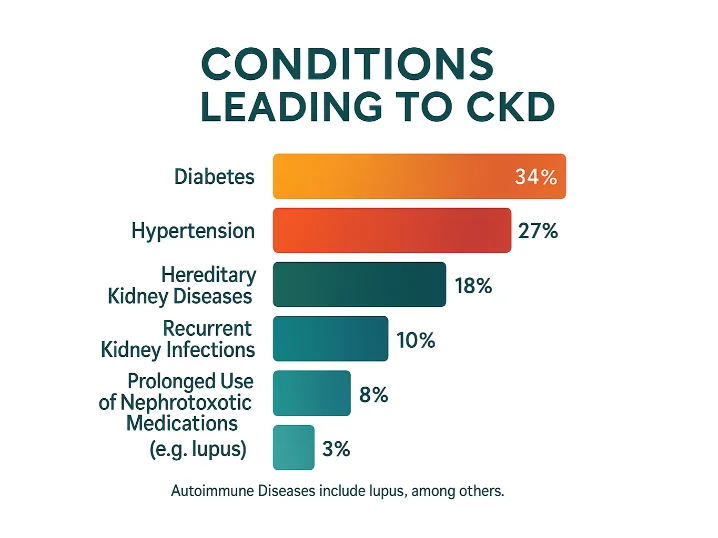Chronic kidney disease (CKD) is a silent yet formidable illness that affects around 10% of the global population. It progresses slowly, sometimes over several years, and can lead to near-total loss of kidney function if not treated in time. But why do some people develop this disease while others do not?
To understand this, we first need to look at how the kidneys work and the many factors that can influence their health.

The Essential Role of the Kidneys
The kidneys are true blood-processing factories. They filter about 180 liters of blood per day to remove waste, toxins, and excess fluid, which are then turned into urine. They also regulate:
Blood pressure
Electrolyte levels (sodium, potassium, calcium)
Red blood cell production
Vitamin D activation for strong bones
When these functions are disrupted due to kidney damage, the entire body suffers.
How Kidney Damage Happens
The kidneys can be harmed by various factors, often linked to chronic diseases that place continuous stress on kidney tissues:
High blood pressure (hypertension): gradually damages the kidneys’ small blood vessels
High blood sugar (uncontrolled diabetes): destroys the glomeruli, the kidney's filtering units
Chronic inflammation or autoimmune diseases: such as lupus, which directly attacks kidney tissue
Obstructions (stones, malformations): block urine flow
Toxic substances or harmful medications that affect kidney function
Main Risk Factors
High blood pressure
Responsible for about 25% of CKD cases, it wears out the blood vessels in the kidneys, impairing filtration.Type 2 diabetes
The leading cause of CKD worldwide. Up to 40% of people with diabetes develop kidney damage. Constant high blood sugar slowly but surely harms the kidneys.Natural aging
Kidney function naturally declines with age. Older individuals often have other conditions like diabetes or hypertension, increasing their risk.Family history
Having a parent with CKD or a hereditary kidney disease (like polycystic kidney disease) significantly raises the risk.Lifestyle
A high-salt diet, lack of exercise, smoking, and excessive alcohol consumption can speed up kidney deterioration.
The Toxic Duo: Diabetes + Hypertension
The combination of diabetes and high blood pressure is especially harmful. High blood sugar damages kidney vessels, while hypertension increases pressure on them. Together, they place enormous strain on the kidneys, impairing their function.
Other Common Causes of CKD
Autoimmune diseases: like lupus
Recurring urinary or kidney infections: can leave scarring
Chronic kidney stones: repeated obstructions
Certain medications: especially long-term use of NSAIDs (non-steroidal anti-inflammatory drugs)
Exposure to toxic substances: such as lead or industrial solvents
How to Prevent Chronic Kidney Disease
The good news is that many cases of CKD can be prevented! Here are some simple but powerful tips:
Control your blood pressure
Keeping it under 130/80 mmHg helps protect your kidneys. To do this:
Reduce salt intake
Take medications as prescribed
Stay physically active
Manage your diabetes
Good blood sugar control prevents kidney complications. Newer medications (SGLT2 inhibitors) also help protect kidney function.
Adopt a healthy diet
Less salt, sugar, and animal protein
More vegetables, fruits, and whole grains
Lower phosphorus and potassium if advised by your doctor
Exercise regularly
Even a 30-minute walk a day can make a big difference!
Avoid harmful substances
Don’t overuse anti-inflammatories (ibuprofen, naproxen)
Avoid smoking
Limit alcohol
Screening: The Key to Saving Your Kidneys
CKD often has no symptoms in its early stages. That’s why regular check-ups are essential:
Urine tests: to check for protein or blood
Blood tests: to measure creatinine and estimate GFR (glomerular filtration rate)
Kidney ultrasound: if needed
Early screening, especially if you have diabetes or hypertension, can slow the disease’s progression.
CKD is often caused by diabetes, hypertension, and unhealthy lifestyle habits. While certain factors like age and genetics can’t be changed, their effects can be managed.Active prevention through a healthy lifestyle, proper nutrition, and regular medical follow-up can make all the difference.
Protecting your kidneys means protecting your quality of life. Even if there are no symptoms at first, the kidneys suffer in silence so it's best to take care of them today!
HEMOFAB’s Commitment to Kidney Health
At Hemofab, we understand how vital kidney health is, especially for people on dialysis or requiring ongoing medical care. Our mission is to develop innovative solutions that improve the quality of life for people living with kidney disease.
Protect Your Fistula with the FAV Protector
If you are on dialysis, protecting your arteriovenous fistula from infection and trauma is essential. The FAV Protector, developed by Hemofab, is an innovative solution designed to ensure your safety and comfort every day.
👉 Discover our solution and order now: FAV Protector
Stay Informed
We’ll continue publishing a series of articles about CKD, its treatments, and best practices for kidney care.
💙 Take care of your kidneys — they take care of you!
📩 Subscribe to our newsletter to receive tips and stay informed about kidney health.